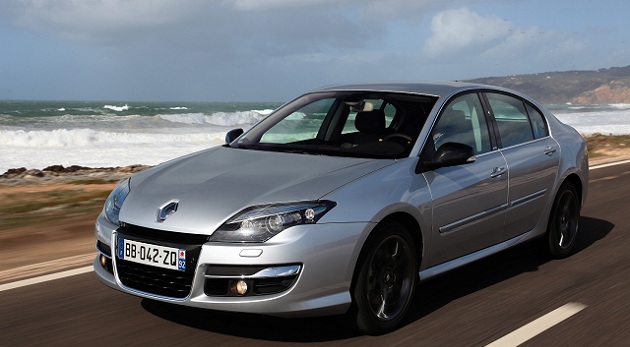


The New Renault Laguna range features six equipment levels, one of which marks an upgrade compared with the 2009 line-up:.
– The Expression equipment level features automatic climate control as standard equipment, as well as automatic headlight and windscreen-wiper activation, aluminium alloy wheels and sport upholstery (plastic-coated fabric/fabric).
– The highly popular Black Edition equipment level comes with sport upholstery (plastic-coated fabric/fabric).
– The Business eco² equipment level is equipped with new Plug&Music connectivity and plastic-coated fabric/fabric upholstery.
– The Bose® version delivers tailor-engineered sound and carries over the principal features of the former Celsium equipment level, plus gloss black interior trimming details.
– New Renault Laguna GT 4Control is equipped with exclusive black 18-inch alloy wheels.
– The Initiale equipment level comes with the Bose® Sound System and visible dashboard stitching.
• The line-up includes a choice of six engines which are even more respectful of the environment (an average fuel consumption saving of 0.5 litres/100km across the range over the 2009 line-up):
– 2.0 140hp E85 eco² (7.5 litres/100km, equivalent to 171g of CO2/km)
– dCi 110 DPF eco² (4.7 litres/100km, equivalent to 120g of CO2/km)
– dCi 130 DPF eco² (5.2 litres/100km, equivalent to 136g of CO2/km)
– dCi 150 DPF eco² (5.2 litres/100km, equivalent to 136g of CO2/km)
– dCi 175 DPF with six-speed automatic transmission (6.2 litres/100km, equivalent to 163g of CO2/km)
– dCi 180 DPF eco² (5.7 litres/100km, equivalent to 150g of CO2/km)• Exclusive equipment:
– 4Control chassis with four-wheel steering
– Bose® Sound System, with tailor-engineered sound
– Carminat TomTom LIVE, fully-connected navigationThe CO2 emissions and fuel consumption of diesel versions of Renault Laguna have been slashed. These versions have so far accounted for 85 percent of the model’s sales in 2011.The diesel engines of the Laguna range (dCi 110, dCi 130 and dCi 150) are poised to evolve in September 2011 with the introduction of new technologies.
- Versions of Laguna powered by the dCi 110 engine will feature world-best CO2 emissions of 109g CO2/km, thanks notably to the incorporation of deceleration/braking energy recovery.
- The Energy line-up of engines gets wider with the 2.0 dCi engines (130 and 150hp), featuring the same technologies as the new Energy dCi 130: Stop&Start, deceleration/braking energy recovery, thermal management technology and variable displacement oil pump. Lagunas equipped with those engines reduce their CO2 emissions by approximately 15 percent, claiming a record of 118g/km.
- Fuel consumption follows the same downward trend:- Lagunas powered by the 2.0 Energy 130 or 150 diesel engines: 4.5 litres/100km
– Lagunas powered by the dCi 110 diesel engine: 4.2 litres/100 km (equivalent to a range of more than 1,500km!). It will be possible to complete a return journey from Paris to Marseille on a full tank.
A new Energy powerplant for the Renault Laguna range
The M9R 2.0 dCi diesel engine available for Renault Laguna will feature Stop&Start technology and deceleration/braking energy recovery (Energy Smart Management, or ESM for short) . The introduction of these technologies will enable it to be included in the Energy line-up of engines.
Renault Lagunas equipped with the 2.0 Energy dCi 130 or 2.0 Energy dCi 150 engines will claim CO2 emissions of just 118g/km (down 18g/km) or 120g/km (down 16g/km) for the saloon and estate versions respectively.
Those two engines (130hp and 150hp) will also see the fuel consumption of 2.0 Energy dCi saloon and estate versions fall to 4.5 litres/100km (a saving of 0.7 litres/100km) or 4.6 litres/100km (a saving of 0.6 litres/100km) respectively.
109g of CO2/km for Laguna’s dCi 110 engine
In addition to the 2.0 Energy dCi 130/150 engines, the Laguna range will also see the introduction of a new 1.5 dCi engine (Type K9K) which will notably incorporate deceleration/braking energy recovery (ESM).
With this new engine under the bonnet, Renault Laguna will return low CO2 emissions of just 109g/km or 110g/km for the saloon and estate versions respectively.
Meanwhile, fuel consumption of 4.2 litres/100km equates to a range of more than 1,500km on a full tank and represents a saving of approximately 10 percent compared with the previous-generation engine.








